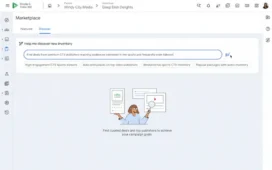Look, I’m not totally convinced that the “Creator Economy” is a thing, outside of a clever promotional strategy that helps to promote the use of social media platforms.
But the U.S. Government is buying in, with The White House announcing an upcoming “Creator Economy Conference”, where industry experts, and creators themselves, will be invited to meet with Government officials to discuss their opportunities, challenges, and more, in order to better inform related policy.
As per The White House:
“The White House Creator Economy Conference (WHCEC) is the first-ever event hosted by the White House’s Office of Digital Strategy that will convene a group of digital creators and industry professionals to discuss the most pressing issues within the creator economy today, including privacy, fair pay, AI, mental health, and more. The conference will foster conversation amongst leaders in the space and provide attendees with the opportunity to make their voices heard by Administration officials. It will also allow members of the Administration to learn from these creators and industry professionals and gain insight on how various issues are impacting their lives to inform policy decisions.”
So it’s a broader meeting of industry representatives and public policy officials, designed to ensure that the Government is aware of the key concerns and pain points for creators, and that the Government is doing all that it can to foster these opportunities.
Though again, the opportunities in the space remain somewhat questionable.
Earlier this year, creator monetization platform Kajabi published a research report which found that 96% of online creators earn less than $100k per year.
Which is in line with other, similar reports over the years. In 2022, Influencer marketing platform Aspire found that only 4.3% of creators make more than $100k per year, virtually the exact same result as Kajabi’s report, while a recent survey conducted by Influencer Marketing Hub also found that over 48% of creators earn $15,000 or less p/a.
Also relevant: 90% of all YouTube uploads never reach even 1,000 views.
Despite big name success stories like Jimmy “MrBeast” Donaldson, who’s converted his YouTube popularity into a billion-dollar business, the reality is that making it as an online creator, or a creator of any kind, is really hard, and for most, it’ll actually be beyond their capability to convert their passion into a profitable venture via online posts.
But the platforms themselves love the concept of the “Creator Economy”, because it reinforces the notion that you too can become millionaires just by posting about what you like. Which sees more people uploading more stuff, and brings more attention to their apps.
So, sure, they’ll tout the “Creator Economy” wherever they can, but the truth is that, like any business venture or career path, it takes real work, real planning, and real creativity and nous to make it as an online creator.
So while there are more opportunities afforded through online exposure, I’m not convinced that there’s an “economy” as such within this structure, where the majority of the benefit is clearly driven towards the platforms themselves.
As such, The White House would likely be better served providing an overview of the actual figures, and the comparative opportunities of other careers and business ventures, while also showcasing the dedication and effort it takes to make it as a small business.
Because that’s what being a creator is, and the truth is that only around 5% of online creators are ever going to make it. Which is a similar rate to novelists, graphic artists, musicians, etc.
Selling a dream is more appealing, for sure, but outlining reality is also important.
You can apply to join the White House Creator Economy Conference here, which, among other things, asks how many social media followers you have.















